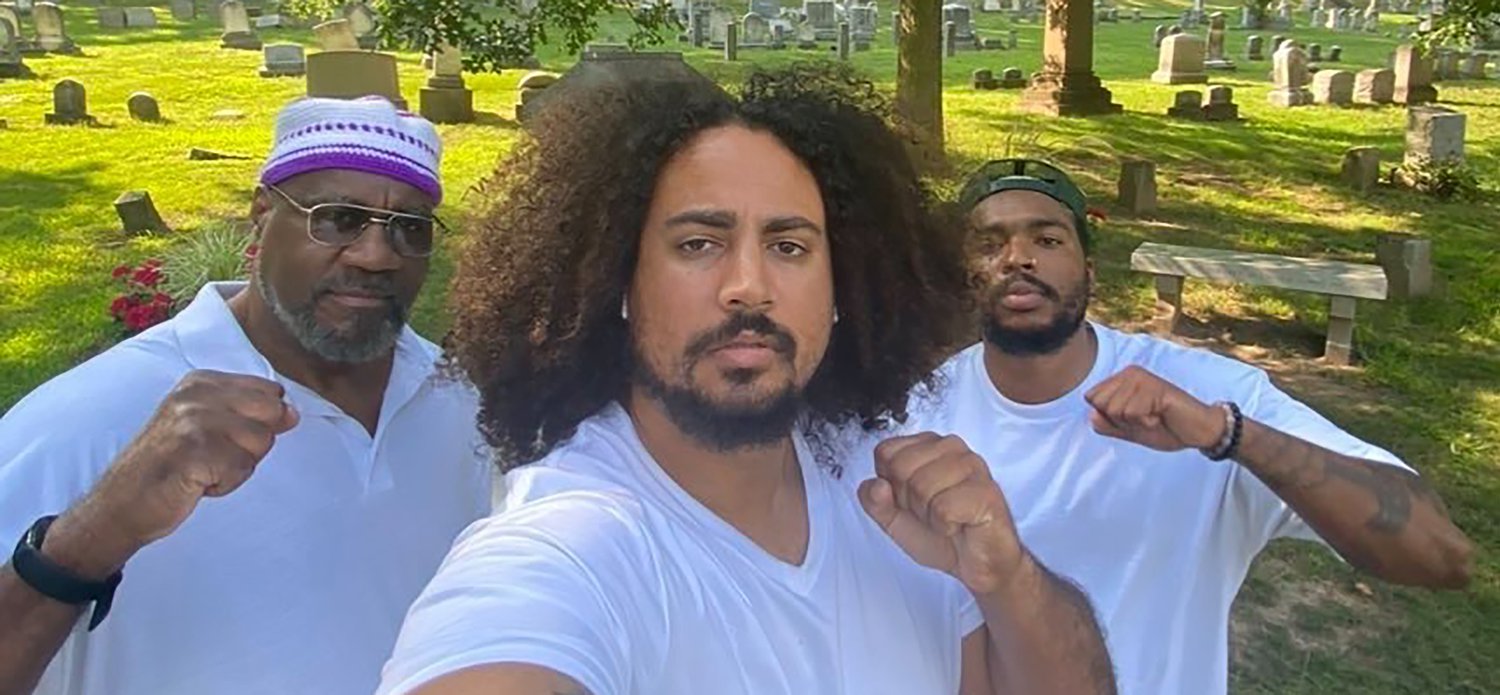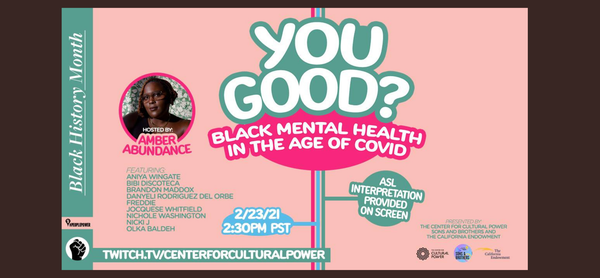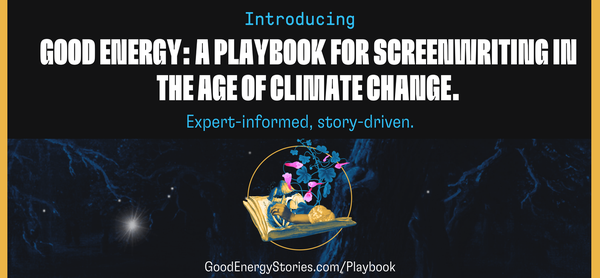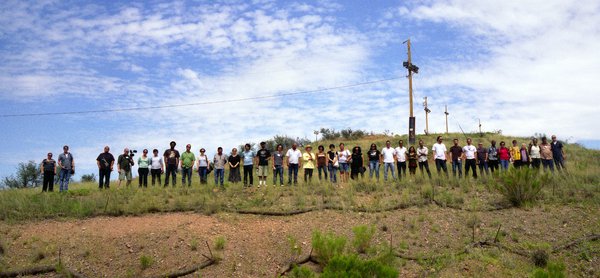
Abbas Muntaqim: On Black August
Black August is a month of honoring the legacy of Black resistance, a time to remember Black revolutionaries and political prisoners, and an opportunity to ground oneself in political education, healing, and reflection. The Center for Cultural Power is pleased to share our conversation with Abbas Muntaqim. Muntaqim is a co-founder of the People’s Programs (formerly People’s Breakfast Oakland), a decolonization program that provides meals, a mobile health clinic, and various other resources to the houseless community in Oakland. Muntaqim is also the co-creator of Hella Black Podcast, a resource for political education. Today we’re sharing his reflections on Black August and the role of cultural strategy in the larger movement for Black liberation.
Editor’s note: This conversation has been condensed and lightly edited for clarity.
The Center for Cultural Power: We’ve come to the end of Black August. A lot of folks use this time for political education, fasting, and reflecting. How has this month been for you? Do you have any highlights you’d like to share?
Abbas Muntaqim: This month is a month to deepen our commitments to organizing. In the spirit of George Jackson and his brother Jonathan Jackson, Black August commemorates the revolutionary struggle behind walls where the abolition movement was forged. A lot of people are talking about abolition these days, but oftentimes, it gets erased that this movement was forged behind prison walls by George Jackson, Khatari Gaulden, and other political prisoners. The Black Guerilla family created Black August to commemorate the struggle of revolutionaries behind walls. So this month, it’s of extreme importance that we re-center ourselves in this fight to free the land, free the people, and ultimately abolish all prisons. It’s a time to deepen our commitments. So for me, a major highlight of Black August is that I’ve been able to spend time with my family, Jalil Muntaqim. He was one of the longest-held political prisoners in the so-called United States. Being able to spend time with family to build and learn has made this a beautiful Black August for me. To be able to learn with someone who has made a lot of sacrifices for our people, and is still out here working has inspired me to hold myself to a higher standard in this fight for Black liberation.
CCP: As we know, Black August is a time to remember fallen revolutionaries and political prisoners. However, there are still many alive today, both in and out of the prison system, who are continuing to work to feed the movement. Jalil Muntaqim had been a political prisoner for the last 49 years because of COINTELPRO, an illegal FBI operation. Muntaqim has been a powerful political educator throughout his time in prison and his book “We Are Our Own Liberators” is a core ideological text for the organizing that you do. What has his release meant for you personally and for the movement as a whole?
AM: I think for me personally, having fam home. For him to finally be home and reunited with his family, his loved ones and his supporters after the illegal COINTELPRO war is beautiful. After he got home, there has still been harassment by the district attorney up here in Brighton and Rochester. So, it just shows that even after you’re released, the harassment from the state still continues. I think it’s a great privilege for us as the younger generation and the movement as a whole to have him home because of his guidance and experience as an elder and because of his political philosophy of being a New Afrikan. He needs to be here and I’m so blessed to be able to build with him. The fact that he’s home and he’s able to guide us, he’s able to really give his knowledge to the movement and now it’s our duty to use the knowledge of our elders who lived these movements. So many times, we’re learning from people who aren’t here no more. People who’ve been assassinated, martyred, or who have had to flee.
CCP: I’m sure there’s a lot that can be learned from someone who has had to navigate being within the prison system as an enemy of the state. Especially someone who has had to deal with surveillance and COINTELPRO in particular. Would you say this is a major consideration for organizers today when doing the work that they do?
AM: Oh fundamentally. We’re able to learn from the past so we can know where to go in our future. The Black Panther Party gives us the best example of what Black revolutionary organizing can look like in the so-called United States. Political prisoners and prisoners of war have experienced some of the most torturous, inhumane conditions, and that’s why we have to call for the freedom of all prisoners. How can we talk about abolition if we’re not centering the people who forged the movement for abolition and centering those who have made the ultimate sacrifices for the movement? We have to free our elders from these cages and that means becoming aware of their conditions. If political prisoners have more rights, than the general population is going to have more rights.
CCP: You’ve often described the work People’s Programs does as “decolonization programs” rather than charity or even mutual aid. Can you break down what you mean by that and how you believe your programs ideologically and practically differ from the others?
AM: Decolonization programs come from the history of survival programs. The Black Panther Party used to say “we have survival programs pending the revolution.” [Decolonization programs are] alternatives to the state that show the people that we can self-govern. We’re not waiting for the government, we’re not waiting for the white man, we ain’t waiting for none of that. A lot of abolitionists are often caught up with destroying but what are we building? What sustainable infrastructure are we building for our people post-revolution?
With charity, on the other hand, they bird feed you. Charity and philanthropy are products of capitalism. They are products of the wealthy being able to wash their money for tax purposes. So philanthropy will never be revolutionary because it operates within a capitalist logic. They can say, “Ok, I want to help this person” but it’s them that’s hoarding all of the wealth. They’re the ones exploiting the worker. Decolonization programs call out these contradictions. When People’s Programs pulls up on 23rd in West Oakland with a health clinic and food programs and the City of Oakland ain’t doing nothing, it shows a contradiction. This begins to show the people that we can organize ourselves. Here you have your average New Afrikan worker pulling together resources to serve and liberate the people, meanwhile people like Jay-Z are investing in ankle monitors, and Beyoncé is wearing a blood diamond that was stolen using slave labor from South Africa. Through class struggle, we’re building towards national unity, and we can begin to identify who our enemy is in our community because there are parasites that look just like us, who will exploit us for their own capitalist gain. And the cold part about it is that they’re just a cog in this capitalistic white machine and they’re choosing to take part in oppressing their own people.
CCP: Speaking of Beyoncé, you’ve received pushback online for your critiques of the Carters, Obamas, Rihanna, and so on. Rihanna has recently become a billionaire and Beyoncé, as you referenced, is the first Black woman to model the yellow diamond for Tiffany & Co. Beyond wealth, what seems to set these figures apart is their immense cultural power within the Black community, which allows folks like Beyoncé to evade criticism while co-opting the language and imagery of Black revolutionaries. What is your assessment of this situation and how do we find our way out of it?
AM: Well, they don’t have any cultural power without the white power structure. If we look at Rihanna, for example, her company Fenty Beauty is using enslaved children in India to mine some of the materials for her makeup brand. That’s a problem in the industry as a whole, but that’s also Rihanna choosing to get her wealth from the exploitation of poor children.
Look at Jay-Z and his label, Roc Nation. And this is something I’ll use to address the “Rap Scene.” In rap, you’re not supposed to fuck with no snitches, right? That’s the culture. That’s basic shit that everybody know. If we look at that, one of the CEOs for Jay-Z record company is a DEA informant. So the power he has is coming from the state and from the economic base of the white power structure.
So when we look at culture, and we understand our own culture, we have to ask: are they actually the purveyors of culture or the purveyors of the state and corporate culture that’s being fed to us. These structures use Black faces because they know how powerful true revolutionary culture can be. So what they do is give us a controlled opposition, it’s a counter-insurgent tactic. But is our culture wearing blood diamonds stolen from the people of South Africa? Mined most likely South African men and women who are enslaved? That’s capitalist culture. That’s what Beyoncé and Jay-Z and these Black billionaires engage in. You can’t be a Black billionaire without engaging in white power and being a part of exploitation.
We have to remove this fake culture that the elite are trying to push. You have Beyoncé cosplaying as a Black Panther, while we have actual Black Panthers houseless and still in prison. It’s a disgrace to our people and it should be seen as parasitic because that’s what capitalism is. It co-opts the revolutionary legacy of the Black Panther Party and puts in its place a cosplay in this moment of #BlackLivesMatter, which is a social consciousness movement. It’s co-opting and funnels organizing back into this idea of Black capitalism.
There is power in culture. If we look at the revolutionary origin of hip-hop, we see that true culture comes from the people. But we have to also understand as revolutionaries that culture alone will never free us. If we’re all running around wearing dashikis and afros but not doing the work for material revolution and decolonization, then we ain’t gon’ have that. We know that culture can push us towards revolution so we gotta develop a revolutionary culture.
The Black Is Beautiful movement, for example, came from the Black Panther Party. So we see that revolutionary culture alongside revolutionary organizing is what will bring a true shift in our people. As revolutionaries, we must also be cultural workers, where we push true culture forward, which is a culture of freedom, self-determination, independence and nationhood.
CCP: Thank you for that assessment. Many consider you a thought leader and someone other organizers and activists look to for perspective. What advice would you have for a younger person who is interested in organizing and political education but doesn’t know where to begin?
AM: I would say for myself and for my co-founder and co-host Delency Parham, it was a process of trial-and-error. So my advice to the youth is to start small. People’s Programs started with me and Delency, two people who were seeing so much houselessness in our community, and, while we were talking about this theory, we weren’t acting. I was contradicting everything I was learning, so I needed to make a shift in my own actions. So I’d say be practical. You can get so caught up in the theory that you forget the actual practical application.
You also must become politically educated. I would describe myself at certain times in my early development as responsive. I was running around at protests, yelling at white people, but what was that actually doing to free the people? I realized that maybe I didn’t know enough. So I had to pick up a book. I read “To Die for the People,” I read “Revolutionary Suicide,” I saw Huey and Bobby were talking about survival programs so I said, “Ok, let’s try this.”
In order to be a revolutionary, you gotta think like a revolutionary. In order to act like a revolutionary, you have to study like one.
Even as I’m talking to you, I’m always committed to learning. Because we’re always being thrown so much propaganda, we have to be in a constant process of decolonizing our minds. I’ve abolished this idea that you “finish” a book. You might read it from front to back but you can always get another take. I’ve read “Assata” three times and each time I’ve had a different take.
You have to study to be a revolutionary. Maintain that study but always do that work.
It’s not that complicated.


